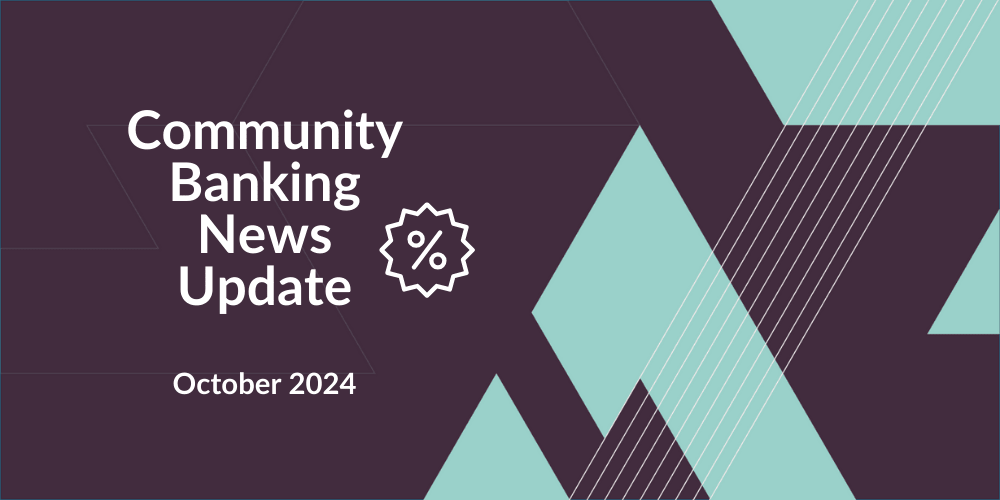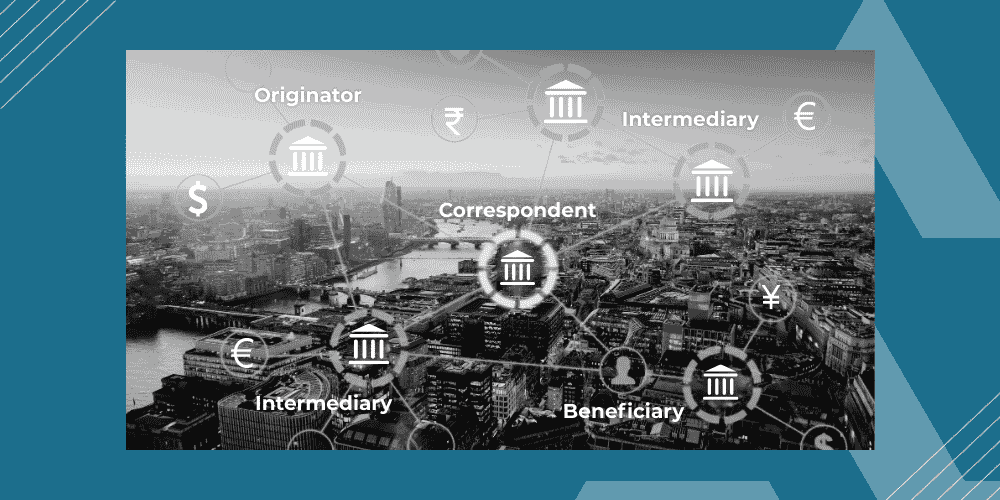This month's major stories in community banking and their impact
Welcome to the latest edition of Community Banking News Update. This month we tackle credit union-bank mergers, new government merger guidelines, the Fed’s latest rate cut, banking technology, fintech partnerships, overdraft fees, and more. Read last month’s issue here.
1. Credit Union-Bank Mergers Break Record in 2024
Credit union acquisitions of banks now stand at 17 this year, exceeding the all-time high of 16 deals set in 2022. In an all-cash deal, OneAZ credit union in Phoenix will acquire Western Arizona Bancorp's 1st Bank Yuma subsidiary to increase scale and diversity. This follows the September 24 merger between Rochester-based ESL Federal Credit Union and rival Generations Bancorp. Credit union-bank mergers have been fueled by credit unions' desire to expand their footprint, diversify business lines, and gain operational scale. Other recent deals, such as REV Federal Credit Union’s purchase of First Neighborhood Bank and U.S. Eagle Federal Credit Union's acquisition of Southwest Capital Bank, are part of a broader trend where credit unions are looking to enhance their offerings, particularly in commercial lending and niche markets like cannabis banking.
While these mergers offer benefits like preserving local financial services and providing cash-based transactions for small banks, they remain controversial. Bank trade groups, including the Independent Community Bankers of America (ICBA), argue that credit unions' tax-exempt status gives them an unfair advantage when acquiring banks. Despite these challenges, the trend shows no signs of slowing, as more small banks look to partner with credit unions to manage rising regulatory costs and digital transformation needs.
Why It Matters to Community Banks & Credit Unions:
The rise in credit union-bank mergers signals significant changes for all community financial institutions, including both banks and credit unions. As the industry continues to consolidate, these transactions reflect a need for greater scale, diversification of services, and expanded reach into new markets. For community financial institutions, this trend offers an opportunity to evaluate their own growth strategies, whether through mergers, partnerships, or expanding service offerings to remain competitive and better meet the evolving needs of their customers.
Moreover, the increase in M&A activity highlights the importance of innovation, regulatory readiness, and operational efficiency. By adapting to these shifts, both community banks and credit unions can strengthen their market position, enhance their customer experience, and continue serving their local communities with a personal touch. This environment encourages all institutions to seek sustainable growth opportunities while preserving their core missions of community service.
2. DOJ Joins OCC, FDIC in Updating Bank Merger Guidelines Amid Heightened Scrutiny
The Department of Justice (DOJ) officially replaced its 1995 Bank Merger Guidelines with the 2023 Merger Guidelines, signaling a shift toward a broader, industry-wide approach to antitrust evaluations. The Federal Deposit Insurance Corporation (FDIC) and the Office of the Comptroller of the Currency (OCC) also released updates to their own merger guidelines, with the FDIC measure evaluating concentrations beyond deposits, such as small business and residential loan originations. These changes come amidst a high level of merger activity in the banking sector, with regulators aiming to ensure mergers benefit consumers and promote financial stability. The updates have drawn mixed reactions from industry leaders, with some welcoming the increased scrutiny and others expressing concern over potential delays and added complexity in the approval process.
Why This Matters to Community Financial Institutions:
The updated guidelines introduce new challenges for community financial institutions considering mergers. With the DOJ's broader approach to antitrust evaluations and the FDIC’s and OCC’s more rigorous criteria, banks must now demonstrate how their mergers benefit the public, enhance competition, and meet community needs. Additionally, the removal of the OCC’s expedited review process means even smaller banks may face longer approval timelines. As the regulatory landscape grows more complex, institutions must thoroughly prepare for detailed evaluations and a potentially longer path to approval.
3. Federal Reserve Cuts Interest Rates for the First Time Since 2020, No Immediate Plans for Further Cuts
The Federal Reserve recently implemented its first interest rate cut since 2020, reducing the federal funds rate by 50 basis points to a range of 4.75% to 5%. This marks a shift after a prolonged period of rate hikes aimed at controlling inflation. While inflation is now near the Fed’s 2% target, recent economic data suggest that the U.S. economy is still performing well, reducing the urgency for further rate cuts. Fed Chair Jerome Powell emphasized that any additional rate decisions will depend on incoming data, including upcoming reports on consumer spending and labor markets. Powell’s comments signal a cautious approach, as the Fed seeks to balance controlling inflation with sustaining economic growth.
Why It Matters to Community Banks & Credit Unions:
For community financial institutions, the rate cut presents both opportunities and challenges. Lower borrowing costs could spur demand for business and consumer loans, allowing institutions to boost lending and support local economies. However, shrinking margins on savings products may require careful management to maintain profitability. Powell’s remarks also indicate that additional rate cuts are not imminent unless the economy shows signs of significant slowing. For community banks and credit unions, this could mean a more measured pace of change in interest rate strategies, providing an opportunity to plan for both lending growth and interest rate risk management.
For more on how to generate non-interest income for a stable source of revenue, read our article:
4. Survey Shows Most Smaller Banks Increasing Technology Budgets in 2024
A recent survey found that the majority of smaller banks, those with assets below $100 billion, have increased their technology budgets in 2024. About 75% of banks reported higher tech spending, with a median budget increase of 4%. However, many institutions are facing challenges in implementing these technological projects, with 60% of respondents noting delays in completing initiatives and nearly a third encountering difficulties integrating new systems. Fraud remains a top concern, particularly with digital channels, as 89% of banks expressed heightened awareness of potential threats like phishing and check fraud.
Why It Matters to Community Banks & Credit Unions:
As community financial institutions ramp up their technology investments, they must balance growth and efficiency and research the challenges that come with new tech implementation. Increased spending on digital solutions is critical for staying competitive, but the survey highlights the need for better planning and execution to avoid delays and cost overruns. Solutions that are pre-integrated with major payment platforms can help ease the implementation lift. With growing fraud risks in digital banking, community banks and credit unions should prioritize both technology upgrades and cybersecurity to protect their customers and assets. This emphasis on technology is not only about modernization but also about enhancing operational resilience in an increasingly digital financial landscape.
For more on how pre-integrated technology can streamline international wire processes, read our article:
5. FDIC Proposes Stricter Recordkeeping for Banking as a Service (BaaS) Partnerships
The FDIC has proposed a new rule aimed at improving the transparency and security of Banking as a Service (BaaS) partnerships between banks and fintech companies. This comes in response to the collapse of Synapse, a BaaS provider, which resulted in millions of dollars of frozen customer funds. Under the proposed rule, banks partnering with fintechs will be required to maintain detailed, daily reconciliations of fintech customer deposits. This would ensure that banks can accurately identify the owners of deposits, even in the event of a fintech's failure, protecting customer access to their funds and ensuring compliance with anti-money laundering (AML) and counter-terrorism financing (CTF) regulations.
The rule aims to address the growing complexity of certain subset of BaaS models, where customer funds from multiple users are often pooled in a single account at the partner bank. Without proper tracking, it becomes difficult for banks to determine which deposits belong to which customers. The proposed regulation would ensure that banks using BaaS platforms maintain more granular records, allowing for quicker resolution in cases of fintech failure, and providing regulators with better oversight to enforce financial compliance.
Why It Matters to Community Banks & Credit Unions:
For community financial institutions engaged in BaaS partnerships, this proposed rule is vital to mitigate risks associated with fintech collaborations. By implementing more stringent recordkeeping requirements or working with BaaS companies that do real-time reconciliation, banks can better manage the risks of pooled accounts, safeguard customer trust, and enhance compliance with regulatory standards. Adhering to these requirements will also position institutions as responsible, reliable partners in the fintech space, helping them stay competitive in offering innovative digital services without exposing themselves to undue risk.
6. CFPB Pushes for Stronger Proof of Customer Consent for Overdraft Fees
The Consumer Financial Protection Bureau (CFPB) is tightening regulations around overdraft fees, now requiring banks to provide clear proof that customers have opted in to overdraft programs. Under the new guidelines, banks must offer documented evidence, such as a signed agreement or a recorded conversation, to confirm a customer’s consent. CFPB Director Rohit Chopra emphasized that this move is intended to ensure transparency and prevent banks from charging fees without explicit authorization from customers. This updated regulation is part of a broader CFPB initiative to reduce abusive fee practices across the financial sector.
Why It Matters to Community Banks & Credit Unions:
For community financial institutions, this new overdraft fee regulation will require adjustments to customer onboarding processes and recordkeeping. By ensuring that customers explicitly opt into overdraft services, institutions can avoid potential compliance risks and maintain trust. Community banks and credit unions will need to streamline their documentation practices, such as implementing systems for recording consent through digital signatures or voice recordings. Adapting to these changes will be essential to comply with CFPB oversight and protect against legal challenges related to unauthorized fee charges.
Acceleron builds cutting-edge software that allows community banks and credit unions to conduct international payment transactions profitably through a foreign exchange (FX) marketplace. Serving over 200 financial institutions and facilitating more than $1 billion in international payments annually, Acceleron helps small banks generate non-interest income and compete more effectively with high-fee big banks.
Stay informed and sign up for our monthly newsletter to receive the latest community banking news updates directly in your inbox. We’ll only send the essential information you need.
 Daisy Lin, Head of Marketing, Acceleron
Daisy Lin, Head of Marketing, Acceleron


-1.png)


